Asheville City Council indicated a desire to take a harder line on whole-house, short-term rentals at its Oct. 3 meeting.
Whole-house or whole-unit rentals of less than 30 days such as rented through Airbnb and VRBO are already banned in residential districts throughout the city. The matter came up as Council considered the Haywood Road form-based code, where a proposed zoning change would expand the area of West Asheville in which short-term rentals would be a permitted use.
Council ultimately sent the matter back to the Planning and Zoning Commission to consider removing lodging of 20 rooms or fewer as a permitted use in the Haywood Road district.
Council member Gordon Smith said it’s obvious that City Council is heading in the direction of being more strict on short-term, whole-house rentals, and he asked that Council be given a heads-up when zoning changes are coming before them that have to do with lodging uses. “I think it will save us all some heartache and headache,” he said.
Smith also pointed out that better enforcement of illegal STRs is needed across the city. “There’s hundreds and hundreds of these things still happening throughout the neighborhoods, throughout our city, and what we know is that everybody who’s doing it now knows it’s not legal, and they don’t give a rip about the laws. They don’t give a rip about our housing shortage or our affordable housing situation,” he said. He asked that the city look at how get to zero on “these illegal whole-house, short-term rentals that are negatively impacting our housing stock citywide.”
Council member Keith Young said several corridors in the city are experiencing exponential growth and increasing concerns about short-term rentals. He said the city should stop dealing with them in a piecemeal fashion, such as having discussions about lodging uses in the River Arts District and Haywood Road separately. “I would totally like to see us deal with these issues on a citywide basis and try to bring some continuity to the whole situation,” he said.
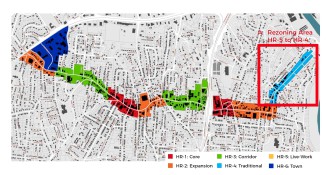
In February, Council passed new rules that require Council approval for any hotel project with 21 rooms or more. Council member Julie Mayfield said at the Oct. 3 meeting that that threshold was put in place because Council was OK with some types of small lodging facilities, like hostels and boutique hotels. But Mayfield seemed to place whole-unit rentals in a different category. “We’re not trying to make all lodging more difficult,” she said. “But what we’re now learning is that people are building small structures of 20 rooms or less intentionally and explicitly for short-term rentals.”
Vice Mayor Gwen Wisler said people are slipping in whole-house, short-term rentals under the 20-room regulation, and perhaps the city should get a chance to approve all proposed lodging establishments. “I also feel like we need to go back and revisit having any lodging of 21 guest rooms or more come to Council and really think about all lodging uses needing to come to Council,” she said.
Council agreed to have Planning and Zoning take another look at removing STRs as a permitted use in the Haywood Road form-based district before Council holds a public hearing and vote on the matter. But it did allow public comment, acknowledging that residents had come to the meeting specifically to speak on short-term rentals.
Casey Campfield said the Council agenda and documents should more clearly state when short-term rentals are going to be discussed. He also pointed to the impact of STRs on residents looking to rent in the long term. “I am here to plead on behalf of the renters of Asheville that you do not expand whole-home, short-term rentals into new sections of town. People are being evicted from their homes,” he said. “Other people who are lucky enough to remain in their homes are watching their rents increase rapidly.”
Mike Collins, who said he owns property on Haywood Road, said he didn’t think short-term rentals would have a negative impact on the neighborhood. “I’m not sure why y’all seemed to make up your mind immediately to kick it back before you heard public comment, because what about the property owners’ rights if they did want to put a short-term rental?” he said.
Whole-house, short-term rentals should also be banned in the Central Business District, said Peter Landis, where currently they are allowed because it is a commercial district. “Otherwise what you risk is turning downtown into more of a tourist area than it already is,” he said, pointing to part-time residents who rent out their homes when they are not in town. “If we want downtown to be a residential neighborhood … and make it more stable rather than have people come in and out who don’t really have any concern except to ride the Pubcycle, I’d ask that there be some consideration as to restricting short-term rentals downtown as well,” he said.
Tempie Avery to receive naming honor
Tempie Avery, a prominent African-American nurse who lived as a slave of the Nicholas Woodfin family prior to her emancipation, could get recognition as the city considers renaming the Montford Community Center to the Tempie Avery Community Center. City Council announced the proposal to rename the center, which sits on the former site of Avery’s home, at its Oct. 3 meeting.
City policy requires that proposals to rename a facility get 30 signatures of registered voters — the Tempie Avery request got 200. Before the city can officially approve the name change at its next meeting, it must solicit the input of neighbors and other interested residents. That input began with several people offering public comment at the meeting in support of the idea of giving Avery her due.
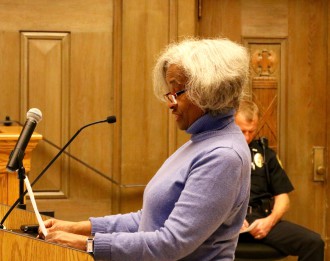
Joe Newman presented Council with the historical context of Avery’s 50 years as a freed woman in Asheville after her 40 years as a slave. “One reason we want to honor Tempie’s life is she became an esteemed midwife who delivered hundreds of babies in Asheville, black and white, throughout the city,” he said.
Young, the sole African-American member of City Council, said he hopes more aspects of Asheville’s black history get public recognition. “I am completely enamored of the history, good and bad, that African-Americans have contributed to this city,” he said. “It’s breathtaking, the breadth and depth of African-American involvement in this community, and I do hope that this will spark something in the future that we can learn more about the contributions of African-Americans in this community.”
Mayfield referred to recent controversy over Confederate monuments, pointing out that in contrast to a state law about changing or removing such statues, facilities such as the Montford Community Center are squarely under the city’s jurisdiction. “There’s been a lot of discussion about monuments these days, and we have some limitations on us about monuments, but things like community centers and fire stations, those are our own,” she said. “I hope this is the first of several or many opportunities to celebrate the history of people in our city that don’t often get celebrated.”
The business of festivals
Two years ago, Council started the ball rolling on a study to look at the entrepreneurial impact of outdoor special events. On Oct. 3, the city heard the results of the study, which include that an annual sales premium of 3.9 percent was experienced by businesses that participated in special events and festivals over those that did not. According to the report, that premium resulted in an additional 54.4 jobs and $2.7 million in annual economic impact. The study also found that vendors at outdoor events get a bigger boost in marketing and exposure than they do in onsite sales.
Jon Fillman, economic development specialist, recommended that the city better facilitate networking opportunities among event vendors and extend outreach to support them. “What we know is that we need to focus on developing these leads,” he said. “The problem is that the vendors, just simply because of the way they conduct business — you know, they may be single parents at home or they may be just starting out with their business — they don’t know what these resources are and they don’t have those natural connections.”
Bond information goes online
The city of Asheville is making it easier for people to learn how bond money is getting spent. Jade Dundas, interim assistant city manager, highlighted new elements of the city’s website that feature tools for real-time updates on capital projects. He pointed out that while the list is not yet comprehensive, users can click on projects to get information on the status, budget, funds spent, location and time frame.
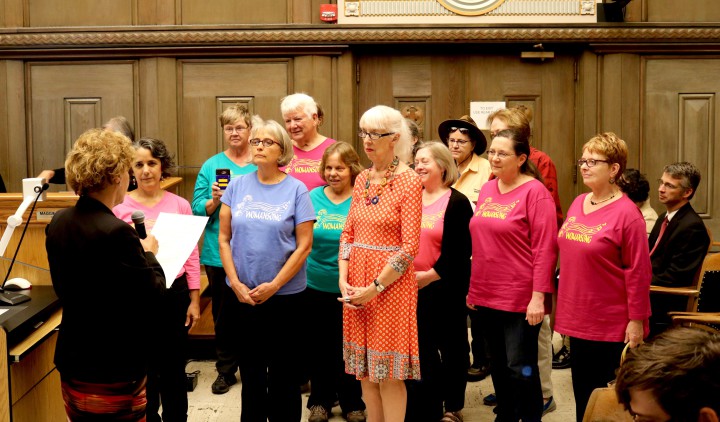
In other business
Council approved a request by developer Barry Bialik to rezone the New Classical Academy property at 671 Sand Hill Road from institutional-conditional to residential multifamily low-density so that the school can expand.
Two nonprofits will receive funds from the city after Council voted to amend the 2017-18 Consolidated Annual Action Plan for Community Development Block Grant and HOME Funds to allocate $12,923 to Asheville Area Habitat for Humanity and $27,989 to Green Opportunities from contingency funds.
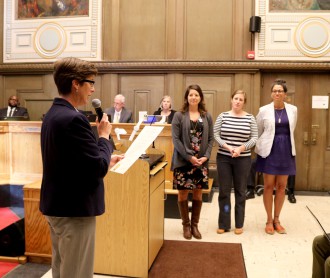
Council reappointed Laura Berner Hudson and appointed Sandra Kilgore and Joe Archibald as new members to the Planning and Zoning Commission to replace Jeremy Goldstein and Kristy Carter, who both recently completed the maximum of two three-year terms.
Mayfield presented a proclamation naming Oct. 5 as Energy Efficiency Day. Members of the Womansong community chorus accepted a proclamation from Wisler declaring Oct. 7 to be Womansong Day.
The Oct. 3 City Council meeting took place the day after a mass shooting in Las Vegas where more than 50 people were killed and more than 500 were injured. Mayor Esther Manheimer began the meeting with a moment of silence: “We have a lot of things happening in our country; it seems like this last month of September has been particularly devastating. I just thought we might want to take a moment — and actually into October now — and have a moment of silence to sort of reflect on our situation and our concern for all the other people that live with us on this planet and are trying to get through and struggle through every day.”
The next meeting of the Asheville City Council is scheduled for Tuesday, Oct. 24 at 5 p.m.



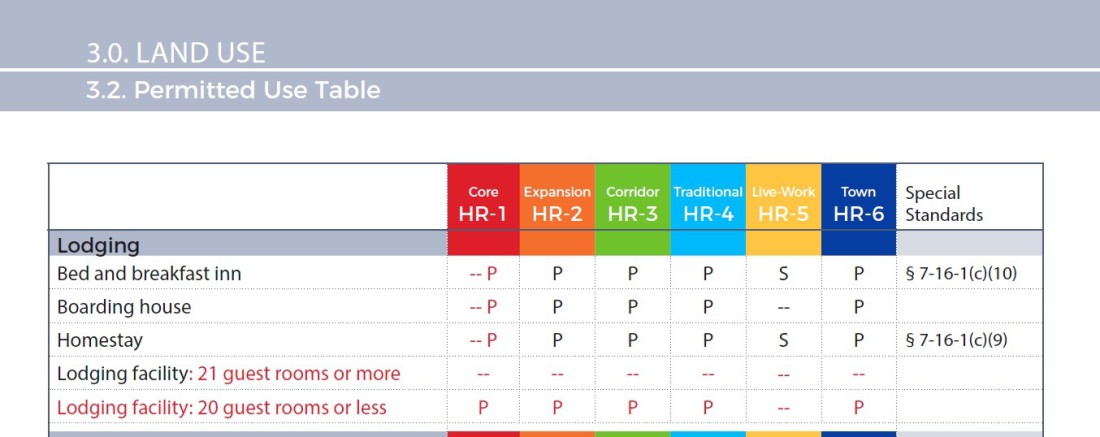
One great way to assure residents that Asheville housing is affordable is to make sure that nobody wants to buy property there.
When you have a socialist ran city that is known for high prices and low wages, why it’s called progress. And the irony is that all the taxes are being funneled to where rich whites gather in the RAD. How liberal of them. These people self identify as socialist and liberals but in all reality have no idea what 99% of the lower middle and poor go through around here.
STR’s cut into the BCTDA taxes that goes back into bringing more, you guessed it, “tourists” into town. If STR owners are not paying the same taxes why as a consumer would you stay in one of the many overpriced hotel rooms in the community.
I understand the housing crisis but also see new apartment communities approved by the city monthly…why not force developers to have a higher percentage of units set aside for affordable housing?
Capitalism: an economic and political system in which a country’s trade and industry are controlled by private owners for profit, rather than by the state.
VS
Socialism: a political and economic theory of social organization that advocates that the means of production, distribution, and exchange should be owned or regulated by the community as a whole or (in Marxist theory) a transitional social state between the overthrow of capitalism and the realization of communism.
Government greed wins again! http://www.ashevillecvb.com/history-of-bctda/
LOL, I agree. But the “socialist” in government are only concerned with their hotel friends making money. Why if STRs became the norm, that would rattle too many cronies. Meanwhile property taxes continue to go up to finance, you guessed it, more tourist attractions.
Your support for more actual socialists in city government is noted.
hopefully the affected Haywood Road property owners will ban together and file suit against the elected criminals for TOO MUCH CONTROL of how they use their property…it’s time.
You must not be familiar with municipal zoning jurisprudence in which all the appellate courts across the land have approved of the authority of a city to take proactive interests in residential neighborhoods within (and even without) its boundaries. The enabling law for zoning supervision lies firmly within the four corners of the United States Constitution. What you propose is the anarchy which has characterized the city sitting on its derriere for the last decade or so while STRs metastasized all over Asheville. Much of it started with skanky Scott Shuford as head of P&Z.
I have lived in Kenilworth since 1982 and on the tree-lined eastern margin of Kenilworth for almost 30 years. I have watched Hooters, cathouses, drug houses, and short-term rental flophouses come and go. I have helped all of them go, with gusto. Now with these latest 10 or so years of successions of city councils I have watched outsiders come in and “slum” our neighborhoods with obnoxious airbnb motels. We now have a cluster of them and more coming. One of these outsiders audaciously ordered Morningside Church to silence its church bells which have been tolling for decades. Two more have thumbed their noses at official notices to cease their STRs.
One thing I can tell you: If an indolent, feckless Council won’t deal with these illegal nuisances blighting our neighborhoods and stressing our families and their housing stock, there are other ways for them to be dealt with. A start is to kick the supporters of these flophouses – Manheimer, Haynes, Young, and Bothwell, and their devious city manager, Gary Jackson – out of City Hall.
YES! Vote Wainscott for Mayor! He WILL bring some great changes!